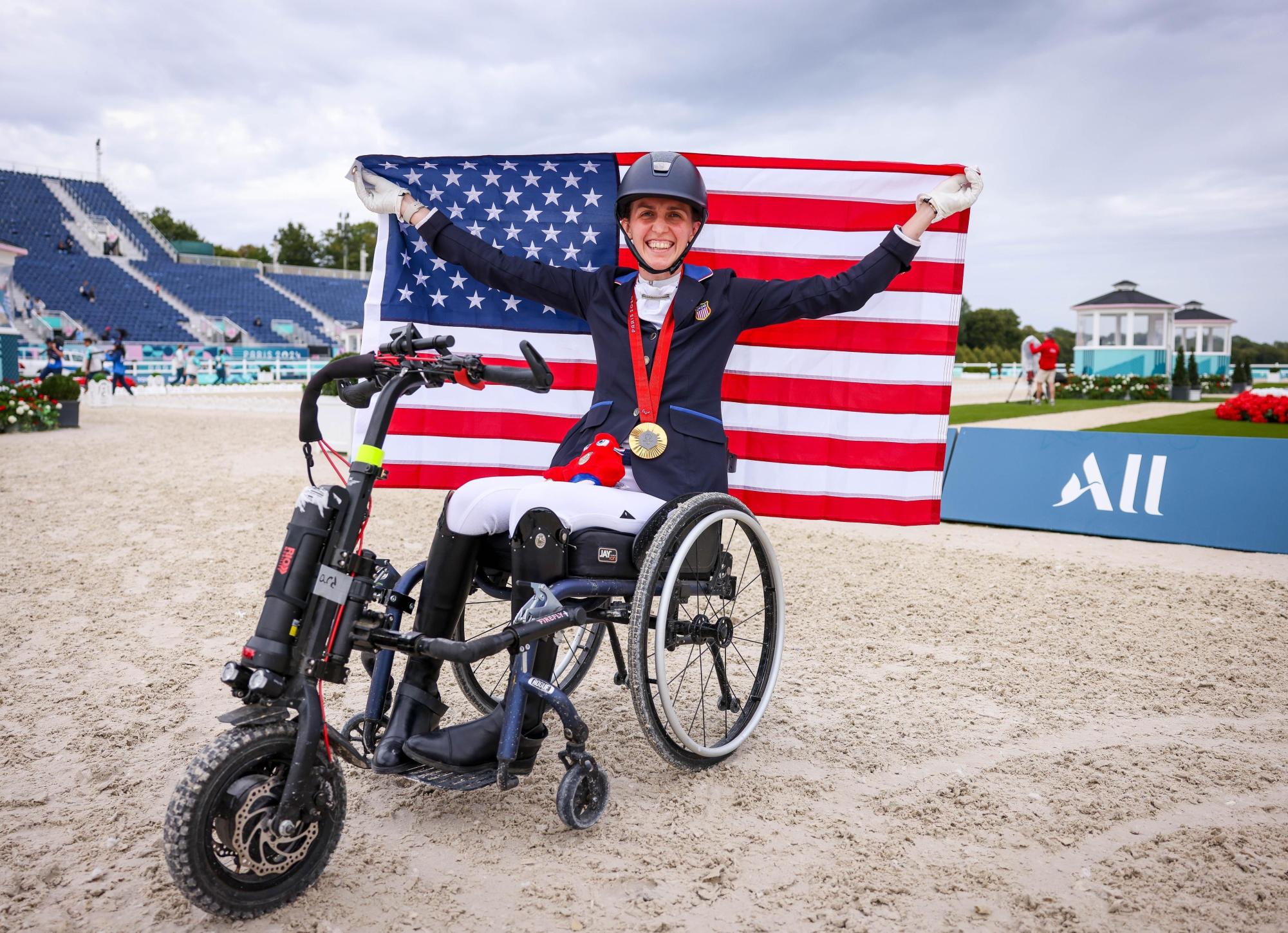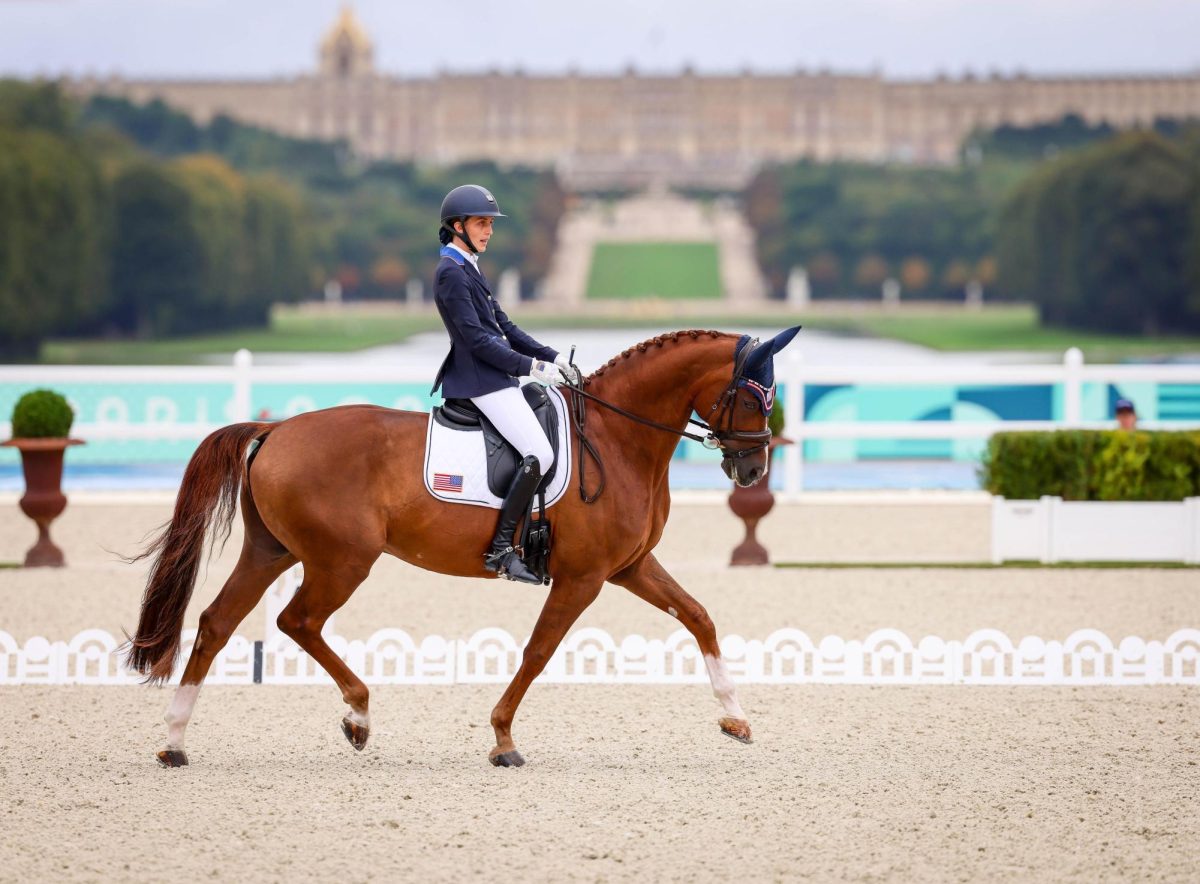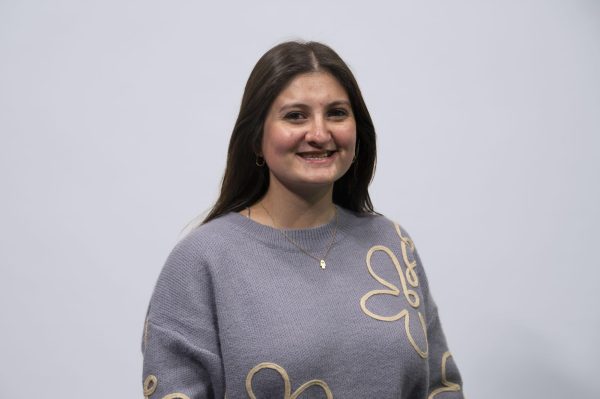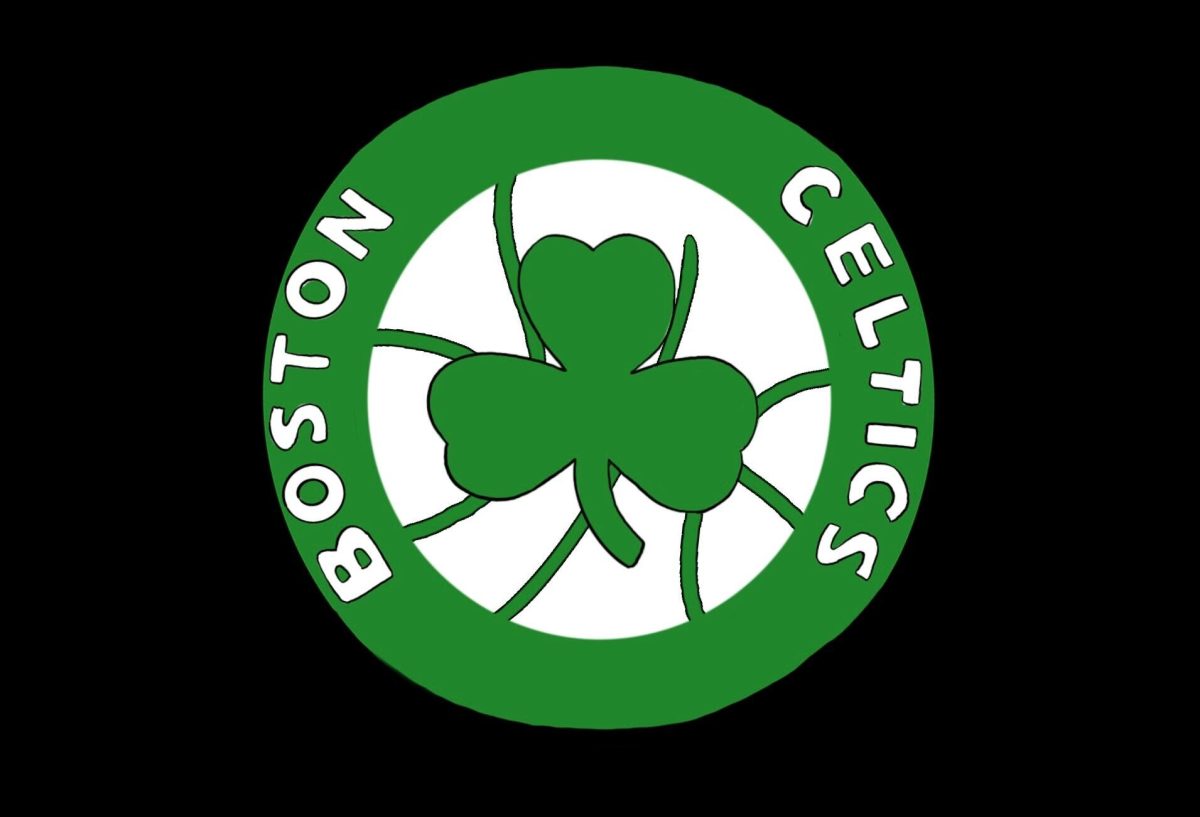At the age of 16, a series of catastrophic health issues left Fiona Howard, then a highly-accomplished junior equestrian athlete, unsure if she would ever be able to get back in the saddle.
Now, almost a decade later, the Northeastern alum not only finds herself ranked among the best para-dressage athletes in the world, but with three Paralympic gold medals under her belt — including the first-ever for the U.S. in the team event. The team’s combined final score of 235.567 is the highest ever recorded in a Paralympic para equestrian team event.
“I just wanted to go out there and do my best. I was just so happy to be there,” Howard told The News. “It all felt a bit surreal. … I just tried to focus on me and do my best, which has kind of been my motto the whole way through.”
Howard was born to an English father and American mother and spent her childhood in London. She began riding at the age of 3, much to her mother’s dismay due to the expenses and discipline the sport demands.
In an attempt to push Howard away from the sport, her mother tried everything she could think of — letting Howard ride ponies that might be more likely to misbehave, sticking her in music lessons for various instruments, teaching her about different sports — but the young Howard was smitten with horseback riding.
“For as long as I can really remember, I just fell in love with the horses … I liked that you could kind of create a bond with them,” Howard said. “It’s a really amazing feeling when you ride a horse and you’re able to trust this really big animal to perform these intricate movements.”
Howard rose quickly through the junior ranks, entering her first competition at 6 years old and her first international event at age 13. The following year, she competed for the British Junior Reining Team in the International Equestrian Federation, or FEI, European Reining Championship for Juniors and Young Riders. The youngest rider in the event, she claimed bronze.
Even as a child, Howard dreamed of competing in the Olympics one day; however, as she entered her early teens, her health began to fade.
“I had been delayed in some fine motor skills when I was younger, and my parents didn’t really think much of it. I was having ankle pain, but I was very tall, so the doctors were just like, ‘It’s growing pains,’” Howard told The News. “As I carried on growing, my feet started deforming. I kept getting injured, and I was tripping over my feet and falling over.”
Her feet continued growing inward, and soon, Howard was unable to place her feet flat on the floor as she walked. Eventually, she began dragging one of her feet along behind her. As her mobility declined, so did her gastrointestinal and cardiac health. It was at that point that her doctors in England, who struggled to pinpoint a cause, recommended the family relocate to Boston to seek a diagnosis from Boston Children’s Hospital.
In 2016, Howard was diagnosed with dystonia, a disease that causes muscle spasms and a general loss of control over one’s body. Her gastrointestinal issues continued to worsen, too, and she was placed on a feeding tube, which she still uses today.
“At first, I didn’t have time to process it at all. One minute, I was in England, and the next I was in Boston,” Howard said. “I was so unwell that I couldn’t really think about [riding] that much.”
After several years of hospital stays and corrective surgeries, Howard decided she needed a distraction and began applying to colleges in the area.
“Right from the beginning, I knew that Northeastern was the right fit,” Howard told The News. “They were not afraid of my health. They were like, ‘We’ll figure it out. We’ll make it work.’”
She enrolled as a psychology major in 2017, and though she spent much of her time studying for tests and doing homework from a hospital bed, she was determined to get her degree. She joined the club equestrian team as a non-riding member her first year, attending practices, grooming the horses and videotaping routines.
“It was super important to me to still socialize and interact with people. [My teammates] were so supportive from the get-go, and we were able to share a passion for the sport together,” Howard said. “It gave me something outside of school work and the hospital.”
In 2019, Howard had another surgery, and 2020 brought a lengthy stay in the intensive care unit she and her doctors weren’t sure she would survive. But she did, and in the summer before her senior year, she convinced her doctors, teammates and coach to let her try riding again.
“All I saw was the inside of these four walls in the hospital. I definitely went through a phase of feeling like my life didn’t have a meaning, and that was really hard for me,” Howard said. “My body was failing, but my mind was still there … so I turned my anger into hope and a strength to do something.”
After a lengthy period of trial and error, Howard was able to not only participate in practices, but compete as well. As her senior year wound down in the spring of 2021, a teammate recommended she train for the Paralympics. Howard initially brushed it off, but as her health stabilized — a development Howard’s doctors partially attributed to her return to riding — and her training became more successful, she began to consider it.
Howard got back into the international circuit in 2022, and soon, she was ranked in the top five para-riders in the world. Shortly after, she and her horse, Diamond Dunes, qualified for the 2024 Paris Paralympics.
Para-sports are designed with slight adjustments from their able-bodied counterparts which allow athletes with disabilities of varying degrees to compete. ‘Para,’ which stands for ‘parallel,’ promises that the adjusted discipline is equal in difficulty to the conventional version of the sport. The athletes in each sport are classified into five grades depending on the physical impairment caused by their disability; in most sports, a lower grade indicates a greater impairment. Howard competes in Grade II.

In their August Paralympic debut, Howard and Diamond Dunes won gold in each of the Games’ three para-dressage tests: the individual competition, with one event for each grade; the team event, in which each country presents a group comprising the top-three scorers from the individual event, regardless of grade; and the freestyle event. In the former two competitions, riders are given a series of movements they need to replicate. In freestyle tests, the rider can choose both the routine and the music.
Howard’s and Diamond Dunes’ winning score of 81.994% in the freestyle competition, earned for a routine choreographed to music from the movie “Avatar,” was a personal best.
In dressage, which is often referred to as horse ballet, both rider and horse are judged based on their ability to subtly communicate with each other and gracefully execute their routine. Equestrian riders often cue their horses by shifting in the saddle, moving their feet in the stirrups or pulling on the reins.
Para-athletes, who may have limited mobility in their trunk or limbs, use a series of compensating aids to both stay on the horse and direct it. For Howard, this means being tied into her stirrups, which are secured to the girth, or the part of the saddle that wraps under the horse’s stomach. Additionally, her reins have small loops through which she can slide her fingers, helping her maintain her grip. To guide the horse, Howard mostly uses soft vocal signals like clicks and whistles.
Howard’s triple gold was unquestionably a huge achievement, but for her, it’s the same goal she’d been working toward her whole life.
“Yes, I didn’t start competing internationally in para-dressage until 2022, but I’ve always trained in equestrian my whole life,” Howard said. “I didn’t realize when I was younger that I was going to be diagnosed with dystonia, but I really think that it’s the path that I was meant to be on. … I didn’t realize it would be the Paralympics, but I couldn’t be prouder that it was.”
Next up for Howard, health permitting, is a run at the FEI World Championships in 2026 and the Los Angeles Paralympics in 2028.
Back in Boston, her accomplishments haven’t gone unnoticed. Though none of the current members of the equestrian team at Northeastern know Howard well, they’ve all been tracking her progress and even watched her Paralympic events together.
“From the brief interactions I’ve had with [Howard], she seems very hardworking and determined,” said Philine Weisbeek, a senior behavioral neuroscience major and three-time captain of the Northeastern club equestrian team. “She’s the kind of person who, if she has an idea, she’s going to do whatever it takes to get there.”
Equestrian in the United States is significantly less accessible than other, more traditional sports. Leasing a horse can cost over $1,000 a month depending on the horse’s pedigree, according to the Bay Area Equestrian Network, and that figure doesn’t include food, vet bills or grooming fees. Additionally, there are few opportunities to compete beyond the high school level. Only 27 colleges offer equestrian as a varsity sport, and it’s only accessible to women.
But according to Kamryn Auguste, a junior cell and molecular biology major and co-captain on the club equestrian team, Howard’s success has caused a spike in interest in Northeastern’s club squad — a phenomenon she hopes will expand to the rest of the country.
“[The team] has about 24 people, so it’s not the biggest program. … But for tryouts this year, there’s been a ton of interest from people who learned about the team either from Fiona’s story or through social media,” Auguste said. “It’s a motivating factor, just to see how far she’s come in her journey and knowing that she was on the team we’re on, in the same place that we are, and has gone on to do such great things.”
While many will credit Howard with both her own success in Paris and whatever positive consequences come from it, Howard attributes much of her advancement to those around her — her doctors, parents and coaches, whose infallible support convinced her to persevere even at her lowest points. And of course, her horses.
“The horses allow me to have the movement that I don’t have, and I can never thank them enough for that,” Howard said. “They let me borrow their legs.”
The Huntington News is dedicated to serving the Northeastern University community with original, professional reporting and creating an environment in which student journalists can learn from one another. Support an independent, free press at Northeastern University with your donation today.










